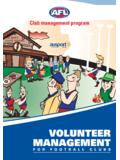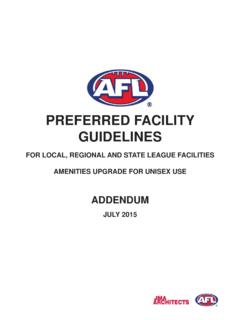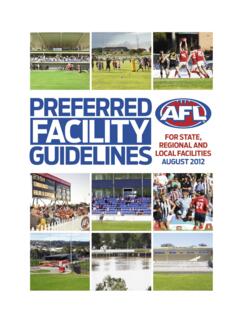Transcription of JUNIOR DEVELOPMENT - AFL Community Club
1 club management programJUNIOR DEVELOPMENTFOR FOOTBALL CLUBSAFL club management programPublished by the Australian Football Manager AFL Game DEVELOPMENT : David MatthewsCommunity DEVELOPMENT Manager: Ed BiggsNational Community Relations Coordinator: Kirsten BirchContent Management: Kirsten BirchDesign and publishing: Roslyn Jeffs AFL PublishingIllustrations: Dennis MillerPrinted by: Condor Printing The Australian Football League acknowledges the signifi cant fi nancial support from the Australian Sports Commission for this of the information included in this resource has been reproduced or modifi ed from the resources published by the Australian Sports club DEVELOPMENT project group:Ed Biggs, Kirsten Birch, Mick Daniher, Peter Hanlon, Colin Lane, David Matthews, Mike O Meara, Graeme Murphy, David Shilbury, Ross Smith, Dean Warren, Lawrie acknowledgement to the following for their contribution.
2 Ross Allen, Eric Bott, Grant Burgess, John Cutler, Peter Di Sisto, Michelle Donat, Cherie Fraser, Quinton Gleeson, Anton Grbac, Peter Harley, Rod Hughes, Roslyn Jeffs, Fiona Macmillan, Annette Maher, Shelley Maher, Paul Matton, Peter McDougall, Paul Milo, Wes Mudge, Rod Nicholson, Tania O Day, Adrian Panozzo, Hayden Park, Peter Quigley, Trevor Robertson, Julianne Rose, Kevin Sheehan, Martin Shields, Bernard Slattery, Bruce Stephens, Mark Stone, John Strachan, Steve Teakel, Kathy Tessier, Clare Toia-Bailey, Rob Veale, Brian Walsh, Bruce 2004 Australian Football LeagueThis information has been prepared by and on behalf of the Australian Football League (AFL) for the purpose of general information. Although the AFL has taken care in its preparation, any person or entity should use this information as a guide only and should obtain appropriate professional advice if required.
3 The AFL does not accept any liability or responsibility for any resulting loss suffered by any reader except where liability cannot be excluded under management program3 JUNIOR DEVELOPMENT FOR FOOTBALL CLUBSW elcome to the AFL club management programThe Australian Football League recognises that club volunteers and administrators make a signifi cant contribution to Australian Football. It also recognises that the demands on club volunteers and administrators are increasing along with the need for clubs to operate in a professional a result, the AFL, in conjunction with the Australian Sports Commission, has developed the AFL club management program aimed at supporting Community football through providing an education program for club administrators. Community football clubs and leagues form the cornerstone of the AFL game and the support of Community club football is a critical component to the overall success of the competition at all AFL club management modules have been developed through extensive consultation with volunteers and administrators and the six modules have been identifi ed as the main priority areas of assistance required by Community module of the AFL club management program has been designed as a stand-alone workshop/ seminar to allow for clubs members to attend the workshops that are particularly relevant to their role within the club or their own the six modules are designed to be stand-alone, it is important to recognise that the planning module is the foundation upon which club management is based.
4 Therefore all club members are encouraged to participate in the planning module and, ultimately the club s overall planning encourage you to attend and be part of all workshops offered through your local league/association and in the process help better your club and grow Community club wish you all the best in these DemetriouChief Executive Offi cerAustralian Football League4 AFL club management programContentsAFL club management program .. 5 Introduction .. 6 Section one - AFL structure, programs and guidelines .. 7 AFL Game DEVELOPMENT .. 7 Supporting Community football .. 9 Community club relationships .. 10 club .. 10 Section two - Participation .. 11 The participation pathway .. 11 JUNIOR DEVELOPMENT programs .. 121. AFL Auskick .. 122. Youth football .. 143. Female football .. 164. Children with disabilities .. 16 Section three - Coaching.
5 17 Training programs - coaching courses .. 17 Mandatory accreditation .. 18 Types of coaching courses .. 18 Section four - Umpiring .. 20 AFL umpiring pathway .. 21 AFL umpiring accreditation courses .. 22 Section fi ve - First aid/sports training .. 23 Education for trainers .. 23 First-aid equipment .. 25 Section six - Community links .. 26 Participation linkage model .. 26 club linkages with AFL Auskick centres .. 27 club linkages with primary and secondary schools .. 28 Linkages between JUNIOR and senior clubs .. 30 Section seven - Recruitment and retention .. 31 Recruiting children .. 31 Recruiting parents .. 32 Communicating with parents .. 33 Player retention .. 34 Section eight - Providing a quality club environment .. 35 club environments .. 35 Codes of conduct .. 35 Risk management .. 38 Summary .. 42 Glossary.
6 43 Notes .. 44 References .. 44 Further information .. 44 Appendices .. 455 JUNIOR DEVELOPMENT FOR FOOTBALL CLUBSAFL club management programThe AFL club management program consists of the following modules:Planning The purpose of this module is to: Identify the need for clubs to plan. Provide the basic framework for organising a planning workshop. Outline the planning process and the 10 basic stages involved. Provide practical templates to assist in writing a plan. Identify methods of reviewing the effectiveness of the management The purpose of this module is to introduce: The application of specifi c legal principles in the football environment. Considerations relevant to liability and duty of care. The risk management process. Waivers, indemnities and warnings. Risk management policies and procedures. Legislative requirements.
7 Insurance National Risk Protection Program. Match-day checklists. The importance of establishing a risk management offi management The purpose of this module is to: Outline the rights and responsibilities of volunteers. Encourage clubs to appoint a volunteer coordinator. Outline the importance of job descriptions. Identify ways to recruit, retain and recognise volunteers. Identify how to develop a volunteer management policy. Outline the process of selecting and screening volunteers. Identify the need for succession partnerships The purpose of this module is to: Explore the ways in which a Community club can build relationships with other sports and groups within the Community . Identify how clubs can form favourable partnerships with local government authorities. Develop ways of attracting sponsorship and fundraising opportunities.
8 Show ways of obtaining grants and funding from various agencies local, state and federal level. Establish how to create a healthy environment within the club . Identify how to attract and support umpires. Provide ways clubs can promote their activities within the management The purpose of this module is to: Explore the roles and responsibilities of the treasurer within a football club . Outline the processes involved in and the issues that should be addressed when considering the fi nancial management of a football club . Provide information that will assist the club treasurer in fulfi lling his/her role with regard to the fi nancial management of a DEVELOPMENT The purpose of this module is to: Develop an understanding of AFL Game DEVELOPMENT structure and philosophy. Provide an understanding of the underpinning principles at each level of the participation pathway with a focus on AFL Auskick, youth football, recreational football, female football and children with disabilities.
9 Identify the responsibilities of clubs and AFL Auskick centres in relation to the organisation of JUNIOR programs and competitions. Outline the coaching and umpiring support and resources available for all levels of Australian football. Identify the value in developing club links with AFL Auskick centres, schools and the Community . Indicate ways of recruiting and retaining children and parents in JUNIOR DEVELOPMENT programs. Highlight the importance of developing a quality club club management programIntroductionThe AFL recognises that Community football clubs, together with the contributions of thousands of volunteers, form the cornerstone on which the game of Australian Football is module considers the participation pathway and the philosophies, guidelines and requirements of players and volunteers in JUNIOR football.
10 The effective management of JUNIOR DEVELOPMENT is vital to the success of any football club . JUNIOR DEVELOPMENT is about succession planning to ensure that your club has a continued fl ow of players, offi cials, coaches, umpires, parents and purpose of this module is to: Develop an understanding of AFL Game DEVELOPMENT structure and philosophy. Provide an understanding of the underpinning principles at each level of the participation pathway, with a focus on AFL Auskick, youth football, female football and children with disabilities. Identify the responsibilities of clubs and AFL Auskick centres in relation to the proper organisation of JUNIOR programs and competitions. Outline the coaching support and resources available for all levels of the AFL game. Provide an outline of the AFL umpiring pathway. Identify the value in developing club links with AFL Auskick centres, schools and the Community .








